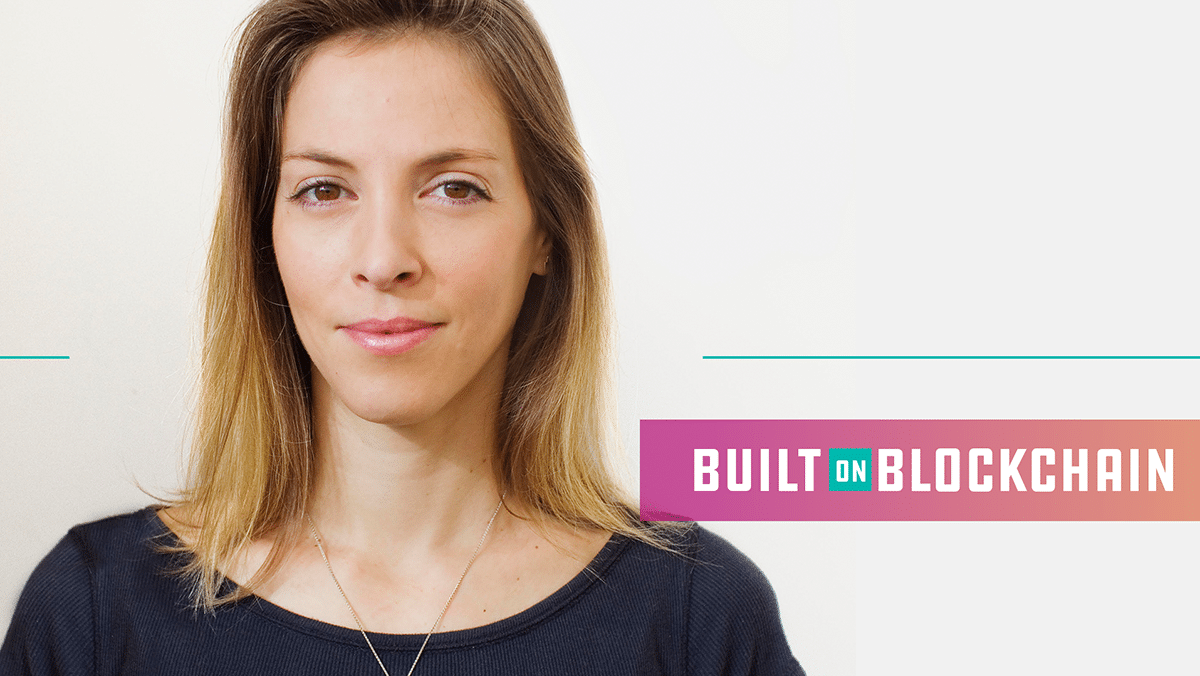In our conversation, we discuss the impact of software on monetary tools, the nature of trust as it pertains to cryptocurrency, the Bancor protocol, blockchain and immutability, and the decentralization of value creation.

The world of blockchain attracts an amazing array of thinkers, creators, and innovators, and in the process of creating our Built on Blockchain documentary series, we’ve been extremely fortunate to connect with some truly remarkable individuals—from utopiasts and decentralization evangelists, to developers and cryptocurrency influencers, to hackers, activists, academics, and more.
One such individual is Galia Benartzi, a co-founder of the Bancor protocol. As described on her organization’s website, “The Bancor Protocol is a new standard for cryptocurrencies called Smart Tokens, which are autonomously and continuously convertible to other tokens in the network at algorithmically calculated rates.”
Galia was recently profiled in a Forbes article entitled Five Female Rock Stars Leading the Crypto Scene in 2018, in which the author notes that, “Bancor held one of the most successful ICOs (at the time it was a world record), raising more than $153 million from 10,000 participants in less than three hours. Bancor allows anyone to create their own cryptocurrency and operate it independently of a third party exchange.”
Needless to say, we were thrilled at the opportunity to speak with Galia, and we covered a lot of ground over the course of our conversation, including topics such as the impact of software on monetary tools, the nature of trust (and trustlessness!) as it pertains to cryptocurrency, the decentralization of value creation, and more.
Thanks so much for talking with us today Galia! Let’s begin with your thoughts on what blockchain means for the world of money.
Blockchain brings software to monetary tools, it brings software to ledgers, and software to databases. And it allows us to program whatever we can imagine into the governing code of these applications.
Can you give us an example of the kind of impact software can have?
Imagine if our money supply was dynamically adapting to the global temperature. If that’s something we believe then, as the temperature of the world rises, we should minimize our commerce to allow the temperature to cool, because the risk of the temperature overheating is much greater than the benefit of the increased commerce that we’re doing. You can now actually program money to behave in this way—using sensors and the Internet of Things, and utilizing blockchains to accumulate and analyze data together in an immutable way.
Your mention of immutability leads us to an important concept: trust. Can you share some thoughts on the role trust plays when it comes to cryptocurrencies?
Money is an agreement between people to collaborate in a certain way. Broadly speaking, it’s our agreement to collaborate at all, and it’s our agreement on how that collaboration will take place. So as we go forward with cryptocurrencies, the trust is actually in the trustlessness.
Can you elaborate on what you mean by “the trust is actually in the trustlessness?”
Meaning, we trust the system because we’ve programmed it and designed it in a way that means we need not trust every user of the system in order to trust the system. And what does that mean? You don’t need to know every user of a dollar in order to trust that the dollar will buy a dollar’s worth of goods at the store, and the same with cryptocurrencies. You’re not going to know every person that uses BitCoin or Ether or Bancor or any other currency that you’re using. You can trust the system itself to behave in the way that it’s claimed to behave.
Is it correct then, to say that the software is really what ensures the trustworthiness of the system?
With cryptocurrencies, and with software, and with computer code, you can have a great amount of certainty for how a currency will behave. You can say, “If X parameter happens, then Y units of the currency are issued.” And you can be sure that that’s what will happen. You no longer need humans to enact the collective decisions of the people, because the software is essentially on autopilot and executes the conditions of the program on it’s own.
But people are still important in this equation, because we still determine which currencies and systems we want to embrace, correct?
When there are enough people saying, “This currency is valuable for whatever reason,” that currency will be one we use. It will be valuable by virtue of the belief in it, and the old currency may lose its value or have less of an appeal. So, the interesting thing about the blockchain evolution coming on the heels of the internet revolution—or evolution—is that they’re really part of the same thing. Act One—let’s call it the internet—is not complete without Act Two.
Tell us a bit more about this “Act One and Act Two” idea—the idea of an “internet evolution” and a “blockchain evolution,” as you’ve termed them.
In Act One, the internet allowed us the opportunity to share information freely between people. It’s done a tremendous amount for society—certainly in some nations more than in others—but it has certainly changed the face of human communication and human collaboration to a certain degree. However, the internet of information does not let us transfer value. Value is the other protocol that humans use to collaborate.
We share information, which can be shared freely without corrupting the original. For example, if I give you a video or a photo or a document, I still have it, you now have it, and it’s still valuable. Whereas with value, what we call “money,” when I give it to you, I no longer have it. That’s an essential feature of money—that we know at any given time where it exists and that it exists at one place in one time. As significant as the internet has been for information sharing, it is only now getting it’s other shoe to drop. That is the value revolution—the ability to move value between people, in a secure way, without a central authority. So, when folks look at the internet evolution and say, “Wow, it did some things but it didn’t do that much,” I say, “Wait for blockchain, and then look at this technology as a whole.”
You say, “wait for blockchain,” but really, it’s here already, isn’t it? Or, at least, it’s coming?
When people can move information and value freely without central control between them, those people are free to collaborate. It means we can really build the things we would like to see in the world. You needed the money to build the things, before you had the information flowing but not the value. Once we have them both, let’s see what takes shape.
As a co-founder of the Bancor Protocol, you’re certainly someone who is helping a new future “take shape.” Can you tell us a bit more about the Bancor Protocol?
The Bancor protocol is a standard for smart tokens, that essentially aims to allow all cryptocurrencies to talk to each other. What do currencies want to say to each other? They want to tell each other what their exchange rate is—how many of that token equals how many of this token?
Why do you feel it’s important to have this kind of communication and convertibility between cryptocurrencies?
The benefit to society of having an automated exchange rate mechanism that allows any cryptocurrency to be continuously convertible into any other cryptocurrency at some mathematical, transparent exchange rate is that, now, any currency created by anyone in society has the opportunity to be liquid. Liquidity, of course, is the lifeblood of currency because it’s what makes a currency valuable. It’s being able to trade a currency—whether it’s a dollar or a Bitcoin—for whatever you want in the moment. Allowing all new currencies the opportunity to be liquid to all other existing currencies is to create an infrastructure for the new economy. And we’ve created it as a not-for-profit foundation. So, it’s a flat and fair infrastructure that lets anyone plug into the system and put their currency into the global network of currencies.
Is it fair to say this represents a kind of democratization of liquidity?
Today, the only currencies that have the privilege of liquidity are national currencies and newer currencies which have enough trade volume to be listed on exchanges. The problem with having such a high volume threshold for liquidity is the same problem that we see in our economies of scale, which is that only the large players survive. There is a tremendous benefit to society and to humanity to having small players survive as well. We know this from local shops. We know this from local food production. We know this from local arts and communities.
“Having smaller currencies survive, and plugged into a global economic infrastructure, means that smaller communities can define their own values and create value networks around their currencies. They don’t need to become enormous to become viable.”
Does this kind of thinking represent a challenge to our existing systems, and is that at heart what this kind of decentralization is really about?
The fight that we’re picking at Bancor is not with anyone in particular. It’s with a system that prevents access to what we believe is a fundamental human right—value creation. Every person is born with the ability and opportunity to create value for society. The tools or the tokens or the infrastructure that we use to give this value to others, to receive this value from others, should be an open and accessible infrastructure. It shouldn’t be owned by governments, companies, or specific people. In much the same way that language isn’t owned by any particular entity. We see the network that lets humans give and get value from each other, whatever that value may be, as a fundamental right of people on this planet.
You’ve spoken before about the move from a “pyramid” to a “web”—can you tell us a bit more about this, and what you envision for the economy of the future?
The fundamental difference between the existing system and the potentially new system is the old system looks like a pyramid. Pyramids have limited room at the top. It’s true that you can climb from the bottom of the pyramid to the top, but there’s only limited room up there.
In the new system, the economy looks more like a web—with more access to information, with more access to capital, with more access to opportunity. It’s true that there are still better and worse places to be on the web, but it’s not as stark as the difference between the top and the bottom of a pyramid. And the mobility throughout the web is much, much greater than the climbing of a pyramid from the bottom to the top.
Does this “web” as you’re describing it essentially represent decentralization? And what does this mean for value creation in the future?
The decentralized and open source paradigm is very, very different than the centralized, proprietary paradigm that we find ourselves in today. The big question for companies of the future is going to be: how do you create value for users and for participants in the creation of your networks, or the building of your companies, or your projects, without owning your inventions? Without owning your networks? How do you create value while still letting the people own the networks?
Today at Udacity, we have thousands of students studying to become blockchain developers. What does this all mean for them?
When you code in an immutable environment, where you’re creating smart contracts that can not be changed, that’s a very different coding paradigm than the “build fast and break things,” or the constant iterative process, that we do on centralized software bases. It’s a very, very different paradigm.
“In terms of the marketing side of business, you need to impress users without forcing them to stay in your products. You need to give them a value and a service that’s so valuable that they want to stay. You win by setting them free. Not by locking them in.”
So, I think that the open source and the immutable paradigm that we go into is very different for developers on a code level. It’s very different for marketers, and for product people, and it’s very different for users. The accountability that a user has in this world—to take ownership of our decisions of which products we’re using, and how we’re using them, and what they do to us, and whether we like what they do to us. These are conversations we need to have, and I think a maturing technological society is ready for these conversations.
Given how rapidly the worlds of blockchain and cryptocurrency are evolving, how important is agility for a developer in the field?
On a very basic level, the languages, as they always have, have evolved. And computer programming languages continue to evolve. Today, it is important to know Solidity, which is the language of the Ethereum blockchain, and tomorrow, it may be important to know a different language, the one that will be the language of a new blockchain that is coming up to the scene. Some of the old languages persist, and some new ones come in. I think the real demand of modern developers is agility because things are changing really quickly and when we’re coding these decentralized applications in this blockchain paradigm we’re really on the cutting edge of these technologies.
How big are the challenges we currently face, and who stands to have the biggest impact in ensuring we move in the right directions?
I think that beyond the software developers or the coders, the design thinking crowd is going to be more in demand than ever. Design thinking is a fluid term, but it’s really about being able to look at an entire system and to really think through what the chains of outcomes that are happening, that could happen, that should happen. Especially when it comes to currency design, to governance design, we’re going to need our anthropologists and our psychologists and our mathematicians and our spiritual guides and all of the other skills that we have in a society to help us not only code the thing, code the currencies, code the frameworks, but design them and also test them and analyze them and iterate on them.
Decentralization is a theme that emerges time and again when discussing blockchain. Why is that?
“The superpower of blockchain is decentralization.”
To remove the center of control from any product or service, let alone money, which is the underlying operating system of all our products and services, is its superpower. It’s never been seen in human history before, and it will lead us to create products and services that are fundamentally different; where the incentive structure is fundamentally different, or the outcomes are fundamentally different.
Galia, we can’t thank you enough for sharing your insights with us! Right now, in our classroom, a new generation of blockchain developers is at work acquiring the skills they’ll need to start making an impact in these arenas. We’ve no doubt your work—and your words—will be very meaningful and inspiring for them. There’s no question the world is changing, and a vast new future awaits as we explore what these technologies offer to us. We’re excited to see where your work leads you, and we look forward to following your progress. Thank you again!


